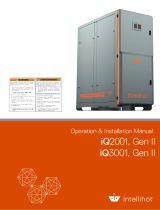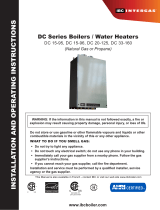
iQ251D Wiring Diagrams and Troubleshooting 52
May 2018 - Revision 01
15.3 Troubleshooting Guide
Description Possible Cause Remedy
Blower
Speed Fault
• Blower noisy / impeller jammed.
• Disconnected signal wire.
• Wiring faulty.
• Inspect blower / impeller. Clean and remove any
obstructions.
• Check PWN signal. Check for loose wires / pins, and repair.
• If the problem persists, turn control panel OFF, shut OFF gas
valve, disconnect power from unit, and contact an authorized
service technician.
Igniter
Ignition Failure
• Water over-heat switch tripped.
• Faulty DSI, faulty igniter wire,
faulty ignition connection, faulty
PCB, bad igniter.
• Low gas pressure.
• Wiring faulty.
• Check the pump, cross-over solenoid, and for electrical noise
(DSI).
• Replace part.
• Adjust gas pressure at regulator, check / increase size of gas
pipe, check for gas pipe blockage.
• If the problem persists, turn control panel OFF, shut OFF gas
valve, disconnect power from unit, and contact an authorized
service technician.
Open Sensors
Inlet / Outlet Sensors
• Unplugged connectors.
• Faulty sensor wiring.
• Faulty sensor.
• Heat engine water outlet
temperature sensor.
• Flue temperature sensor.
• Inlet water temperature sensor.
• Faulty controller.
• Check connectors and ensure they are securely connected.
• Check for nicked or broken sensor wiring or connectors. Also
check for corroded or wet connectors.
• Measure resistance of sensor at connector (18 kΩ at 50°F,
10 kΩ at 77°F, 3 kΩ at 140°F).
• Replace controller.
Faulty Sensors
Inlet / Outlet Sensors
• Faulty sensor wiring or
faulty sensor.
• Inlet water temperature sensor.
• Heat engine water outlet
temperature sensor.
• Faulty controller.
• Check for nicked or broken sensor wiring or connectors. Also
check for corroded or wet connectors.
• Measure resistance of sensor at connector (18 kΩ at 50°F,
10 kΩ at 77°F, 3 kΩ at 140°F).
• Replace controller.
Heat Engine
Outlet temperature exceeded set
limit
• Flow rate changes excessive.
• Faulty sensor wiring.
• Faulty sensor.
• Faulty controller.
• Ensure the water flow rate does not change faster than 1
GPM every five seconds.
• Check for nicked or broken sensor wiring or connectors. Also
check for corroded or wet connectors.
• Measure resistance of sensor at connector (18 kΩ at 50°F,
10 kΩ at 77°F, 3 kΩ at 140°F).
• Replace controller.























